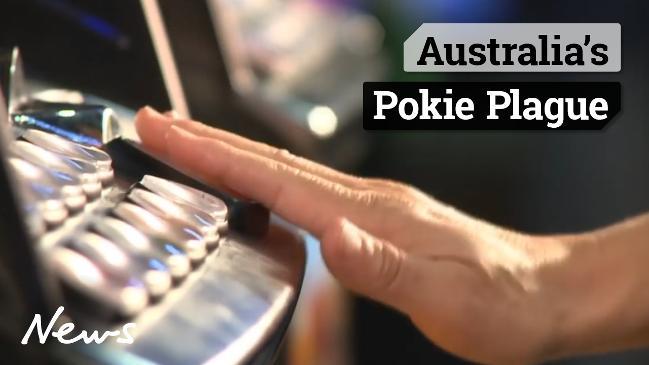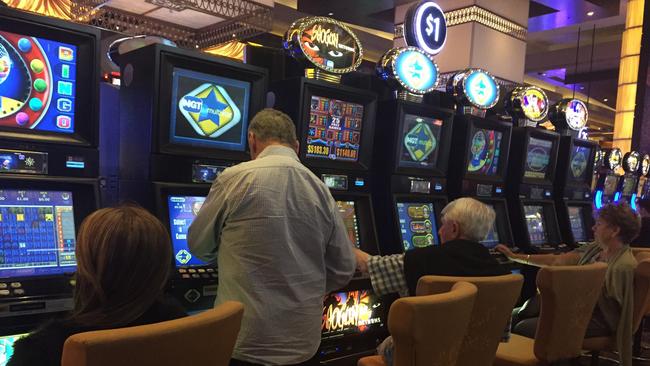Stop profiting from the ‘crystal meth of gambling’
Australians lose more at gambling than any other nation, mostly because of addictive poker machines. It’s a disgrace state governments continue to put profit before people, writes Jane Fynes-Clinton.

Rendezview
Don't miss out on the headlines from Rendezview. Followed categories will be added to My News.
When one level of government’s policy and practice fails to reflect community need or align with others, they need to be shunted into line.
So it is with poker machines.
The Federal Government is so concerned about these noisy, flashy thieves that thousands of welfare recipients in Wide Bay were moved to a new system yesterday that will prevent pokie spending.
Local Federal member Keith Pitt supports the debit card system that blocks payment for booze and gambling, saying an astounding $4 to $5 million per month in Bundaberg and Hervey Bay is fed into the pokies.
Stemming pokie abuse and addressing addiction has local government support too.
A few months ago, the Local Government Association of Queensland, after carrying a motion by Noosa Council, asked the Department of State Development, Manufacturing, Infrastructure and Planning to amend planning legislation to “define electronic gaming machines as a land use and to permit planning schemes to address both the land use as well as the social impacts of electronic gaming machines on communities”.
MORE FROM JANE FYNES-CLINTON: The plastic we should be banning next
In short, the councils want to have a say where and how many poker machines there are, becoming weary of having to deal with the negative fallout that rides shotgun with a glut of blinking, ravenous machines

Noosa Council is the first Queensland local authority to join the national Alliance for Gambling Reform, a Victorian-based organisation that describes the pokies as the “crystal meth of gambling”.
The LGAQ’s planning legislation amendment request is currently being bounced from department to department, with the state saying it wants to retain control of poker machines.
In short, two layers of government acknowledge and are addressing the pokies problem, but the state government does little more than throw up a poster or an ad in acknowledgment.
While both the premier and opposition leader have said they will not grant any more poker machine licences, neither has pledged to rein them in.
MORE FROM JANE FYNES-CLINTON: Zero the only safe blood alcohol level for drivers
The hesitation can only be because of dependence on the ill-gotten gains. Budget papers show the government received $687 million in gaming machine revenue in 2016-17.
The amount being pumped through the machines is staggering.
Figures from the Office of Liquor and Gaming Regulation show that in December last year alone, $90,854,098 was lost in more than 23,000 electronic gaming machines in 406 clubs and pubs across Queensland. That is lost, not bet.
It was a fairly typical month and if you include casinos, the figure leaps to $207 million for December.
More than a billion dollars was lost by poker machine users in Queensland clubs last year.
Australia has 20 per cent of the world’s poker machines and 0.3 of the world’s population. Australians lose more at gambling than any other nation, mostly because of the prevalence and ferocious hunger of pokies.
MORE FROM JANE FYNES-CLINTON: Healthcare workers deserve better than this
Poker machines are designed to be prettily alluring and engaging, coughing up just enough morsels of gold to keep players wanting more.
Poker machines are the only form of gambling designed expressly to make money, and where there is absolutely no chance of influencing the outcome.
Football, cards, horses and roulette all involve decisions about what sort of bet to make and what to bet on.
With the pokies, all that is involved is the press of a button. The rest is up to the machine, and the machine always wins.
The Productivity Commission estimates that more than 40 per cent of revenue that goes through pokies in pubs and clubs comes from those with serious gambling problems, and another fifth from those at a moderate risk of addiction.
Incredibly, the highest concentration of poker machines is in low socio-economic areas: nests of disadvantage and financial stress.
The state government’s unwavering backing of pokies seems unethical at best and deliberately preying on people’s misfortune at worst.
For the people, inevitably, pokies are always a losing bet.
Dr Jane Fynes-Clinton is a journalism lecturer at the University of the Sunshine Coast.
Twitter: @Janefynes


